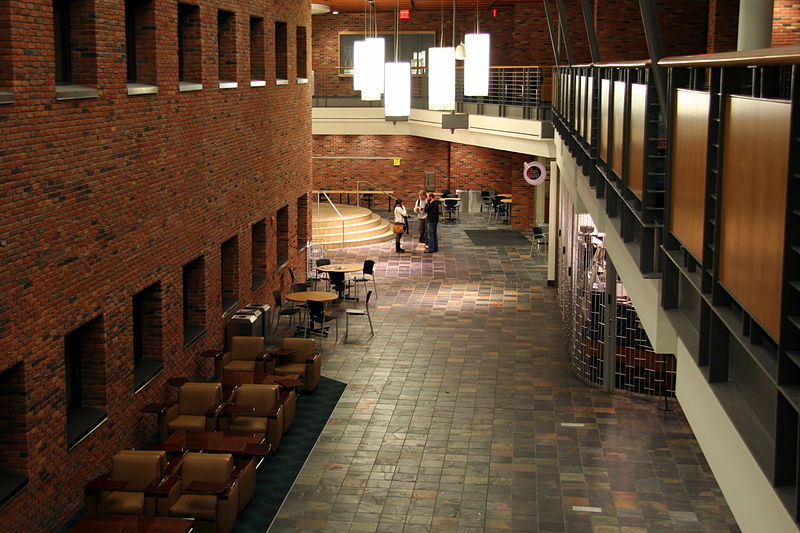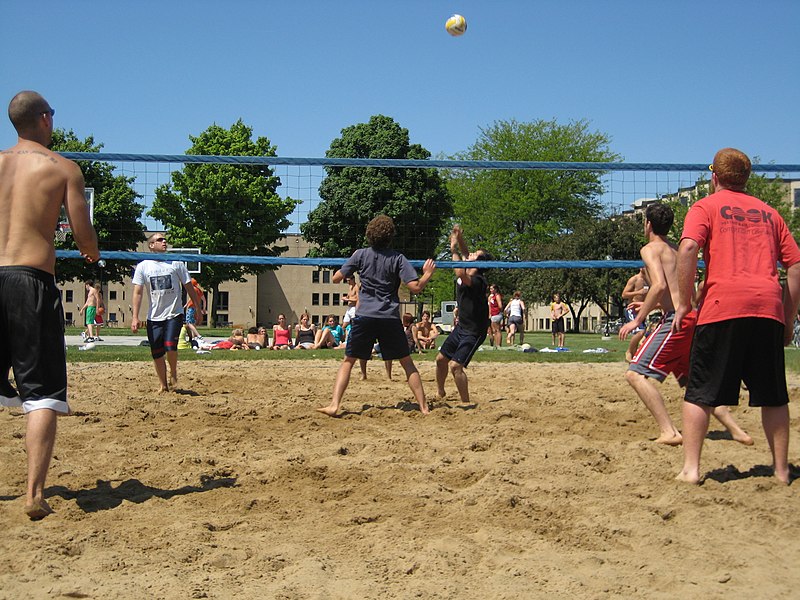静かな朝のチャペル。ベテル大学(米ミネソタ州)の学生がペンと紙をとり、恐れのうちにこう書いた。「神は本当に私を愛しているのか」
[toggle]It was quiet in the morning chapel when a Bethel University student took a pen and paper and put words to the fear: “Does God really love me?” [/toggle]
ベテル大学内(写真:Jonathunder)
インディアナ州ミシャワカの小さな福音派学校に通う学生も紙にこう書いた。「私でいいのだろうか」
[toggle]Then another student at the small evangelical school in Mishawaka, Indiana, took another piece of paper and wrote, “Am I good enough?” [/toggle]「未信者を地獄に送るなんてことが愛の神にできるのだろうか」と書いた学生は3人、「なぜ神は祈りに答えられないことがあるのか」というのは6人、「キリスト教だけが救いなのか」は12人、「神様って本物?」と書いたのは20人だった。
[toggle]Three students wrote, “Can a loving God send unbelievers to hell?” Six asked, “Why does God answer some prayers and not others?” Twelve: “Is Christianity the only way?” Twenty: “Is God really real?” [/toggle]毎年、学生から上がってくるそのような質問や疑問に、ベテル大学学生課の副長ショーン・ホルトグレンは驚くことはない。
[toggle]Shawn Holtgren, Bethel’s vice president for student development, was not surprised at the questions and doubts, which come up for students every year. [/toggle]「教会のユース・グループでは、自分と似たような若者に囲まれているが、ベテル大学のようなところに来ると、学生は自分探しの時期に入る。探求の始まりの過程だ」
[toggle] “In youth group they were surrounded by likeminded kids, and then they come to a place like Bethel, and they enter into a more searching phase,” Holtgren told CT. “It’s a process of beginning to question.” [/toggle]「キリスト教高等教育」に掲載された2部にわたる新たな研究報告によって、福音派大学の学生がどれほど信仰面で葛藤しているかが明らかになった。事実、彼らは、一般的な大学に通う学生や、カトリック、プロテスタント主流派大学の学生と比べ、霊的な部分で落ち着かないと感じ、信仰面では不確かで、今までのキリスト教教育に幻滅し、神との距離を感じ、神に怒りを感じていた。
[toggle]A new two-part study published in Christian Higher Education shows how common it is for students at evangelical colleges and universities to struggle with their faith. In fact, they are more likely to feel unsettled about spiritual matters, unsure of their beliefs, disillusioned with their religious upbringing, distant from God, or angry with God than their peers at secular schools as well as those at mainline Protestant and Catholic institutions. [/toggle]
サウスイースタン大学のブッシュ・チャペル(写真:FireKnight1935)
フロリダ州レイクランドのサウスイースタン大学でリーダーシップ学の助教授を務めるジェニファー・カーターは、136のカレッジと大学で、1万4000人以上の学生を調査・研究し、宗教的葛藤のパターンとその予想因子を探った。
[toggle]Jennifer Carter, an assistant professor of leadership at Southeastern University in Lakeland, Florida, analyzed surveys of more than 14,000 students at 136 colleges and universities, looking for patterns and predictors of religious struggle. [/toggle]そして、福音派大学の学生が宗教的な悩みを抱えるユニークなパターンを発見した。多くの学校では、宗教的な悩みは1年生から3年生にかけてだんだん少なくなる。1年生の時はたくさん疑問を持つが、2年になると自分の信仰に落ち着きが出てくる。
[toggle]Carter found that students at evangelical schools experience “unique patterns of religious struggle.” At most institutions, rates of religious struggle decrease between the first and third year of college. Freshman have a lot of questions. Juniors feel more settled in their beliefs. [/toggle]しかし、キリスト教大学評議会(CCCU、Council for Christian Colleges and Universities)加盟大学に通う学生は逆なのだ。彼らの多くは、大学生活の初めは信仰がしっかりしているが、3年後に危機に陥る。
[toggle]But for students at schools affiliated with the Council for Christian Colleges and Universities (CCCU), it’s the other way around. They tend to feel secure in their faith at the start of college but three years later, they’re in crisis. [/toggle]これは逆のように思える。福音派大学に通う人は(たとえそれが部分的であっても)、その学校によって信仰が育まれることを願っている。しかしカーターは、自分がペンシルベニア州のバレーフォージ・クリスチャン・カレッジ(現在のバレーフォージ大学)に通っていた頃の経験をその調査結果を見て理解したという。
[toggle]This seems backwards. People go to evangelical colleges and universities—at least in part—because they want a school that nurtures their faith. When Carter looked at the results of her study, though, she said it helped her understand her own undergraduate experience at Valley Forge Christian College (now University of Valley Forge), in Pennsylvania. [/toggle]「クリスチャンの家庭で育ち、キリスト教大学に進んだのに、私は多くの疑問を持っていた。そして、そのことに罪の意識と恥ずかしさがあった。大学を出る頃にはしっかりとした信仰を持っているだろうと思っていたのに、疑問と疑いを抱えたまま卒業した。それが普通だとは知らなかったのだ」と彼女は言う。
[toggle] “I was raised in a Christian family, went to a Christian college, and had a lot of questions—and felt a lot of guilt and shame about that,” she said. “I thought when I left college I’d have this really solidified faith, and I left with questions and doubt. I didn’t know that was really normal.” [/toggle]カーターがカルフォルニア州のアズサ・パシフィック大学で社会学を学んだ際に新たな見解を得た。「危機は、成長の前に訪れるもの。一般的な人生論でもそう言えるが、信仰面では特にそうなのだ」
[toggle]In graduate school at Azusa Pacific University in California, Carter found that her studies in social science gave her a new perspective. “Crisis is a precursor to growth,” she said. “We can see that in life generally, but in faith especially.” [/toggle]神の計画による危機
[toggle]Crisis by Design [/toggle]ある福音派大学では、宗教的危機は神の計画によるものだとする。ニューヨーク市にあるナイアック・カレッジでは、学生の信仰を揺さぶるようなチャペルの説教と、それに合わせた授業が1年生のために組まれている。
[toggle]At some evangelical schools, religious crisis is provoked by design. Nyack College in New York City offers a slate of first-year classes coordinated with chapel talks meant to challenge students’ beliefs. [/toggle]
ハドソン川を見下ろすナイアック・カレッジのロックランド・キャンパス(写真:MR1882)
ナイアック・カレッジで霊的形成の助教授を務めるワンダ・ウォルボーンは言う。「これは彼らの信仰を分解するようなものだ。それも良いやり方で。私たちは注意深く愛を持って、学生をイエスのもとへ、行いによらない神の恵みへと戻すのだ」
[toggle] “It’s almost that we have to deconstruct their faith, but in a nice way,” said Wanda Walborn, associate professor of spiritual formation at Nyack. “We have to carefully and lovingly get you back to Jesus, get you back to the grace of God, outside of performance.” [/toggle]これは何も目新しいことではない。ニューヨーク州ビンガムトンにある州立大学で高等教育の歴史を研究し、『原理主義U──高等教育でも信仰を保つ』の著者アダム・ラアツは、「霊的な葛藤を経験するのは宗教的伝統だ」という。福音派の宣教師が1920年代、30年代、40年代のバイブル・カレッジの教育を振り返り、口頭で残した記録を見ると、たいていが大学時代に霊的に葛藤したとある。
[toggle]This isn’t a new phenomenon, either. Adam Laats, a historian of higher education at the State University of New York at Binghamton and the author of Fundamentalist U: Keeping the Faith in Higher Education, said provoking spiritual struggle is part of the religious tradition. He looked at oral histories of evangelical missionaries, recalling their Bible college education in the 1920s, ‘30s and ‘40s, and found they almost always talked about their college experience as a time of spiritual struggle. [/toggle]ラアツは言う。「それが標準のパターン。伝統的な回心の道筋と同じで、必ずしも不満があったのではなく、霊的な心の乱れを経験したのだ。その頃に心の乱れがあったことを思い出して、後に『クリスチャンとして働く準備をするために、学校が意図的に私たちをそうしたんじゃないか』と言ったのだ」
[toggle] “It was a standard trope,” Laats said. “It’s that sawdust trail tradition. They experienced spiritual tumult, though not necessarily disaffection. They remembered having that sense of tumult and they said, later, ‘I think that was what the school intended, to prepare us for Christian work.’” [/toggle]クリスチャン大学の近年のリーダーは、学生を霊的な危機に陥れる必要がない。学生が霊的にそのような状態になることをあらかじめ想定して、その危機を切り抜ける手立てを用意しているからだ。
[toggle]Contemporary leaders at Christian colleges and universities don’t really have to push students to spiritual crisis. They expect students to come to this point in their faith and prepare to help them through it. [/toggle]ミネソタ州セント・ポールのべテル大学(インディアナ州にある同名大学とは別の学校)のクリスチャン・フォーメーション副所長のローレル・バンカーは言う。「学生が経験することのサイクルが分かっています。私たちは、学生が葛藤すること自体を恐れてはいません。気をつけているのは、ひそかに葛藤している学生たちです」
[toggle] “We know the cycle that students experience,” said Laurel Bunker, the associate vice president of Christian formation at Bethel University in St. Paul, Minnesota (not connected to the school of the same name in Indiana). “We don’t fear the struggle. What we’re more concerned with is when students struggle in silence.” [/toggle]アイオア州スー・センターにあるドルト大学の学生は、4年間ずっとキャンパス内で暮らすように決められている。それは、学生が疑問や疑い、困難に直面したとき、相談できるコミュニティーが周りにあるようにするためだ。
[toggle]Students at Dordt University, in Sioux Center, Iowa, are required to live on campus all four years, in part so they have a community around them when they have questions, doubts, and difficulties. [/toggle]「イエスの弟子たちにも、イエスと共にいながらもつまずき、信仰を疑うことさえあったあの3年間が必要だった。それが大切だった。その体験が必要だったのだ」とチャペル担当のアーロン・バートは言う。
[toggle] “Think about the model Jesus had with his own disciples,” said Aaron Baart, the dean of chapel. “They needed three years to stumble alongside him and even doubt their faith. That was important. They needed to do that.” [/toggle]「学生がこの時期に持つ関係が、信仰面で息の長い影響を与える」とバートは語る。ドルト大学の調査によれば、卒業生の96%が毎週礼拝に出席しているという。
[toggle]Baart told CT the connections students develop a have long-term impact on their faith. A Dordt survey found that 96 percent of alumni say they attend church weekly. [/toggle]福音派大学の多くは、霊的な疑問に学生が行き当たること(一般的な学校では直接的・意図的には起こらない)を念頭に置いて学生生活や授業計画を立てている。
[toggle]Colleges across evangelical denominations set up campus life and curricula to address the spiritual questions they know will come up—something that doesn’t happen as directly or intentionally at secular schools. [/toggle]
ゴシェン・カレッジの学内バレーボール(写真:Hochstetler5)
インディアナ州にあるアナバプテストのゴシェン・カレッジ(CCCU加盟ではない)のレベッカ・ストルツフス学長は言う。「人間の成長過程から考えても、葛藤する時期なのだ。大学はそのようにデザインされているし、若者もそうあるようにとデザインされている。葛藤するのは当たり前。私たちが提供しているのは、学生それぞれの人生の旅を尊重しながらも共に歩む、しっかりとした信仰を持ったプロのスタッフと職員だ」
[toggle] “Developmentally it’s a time of struggle,” said Rebecca Stoltzfus, president of Goshen College, an Anabaptist school in Indiana (not affiliated with the CCCU). “It’s part of the design of college and part of the design of being a young adult. Struggle is built in. What we try to provide are professional staff and faculty who are rooted in their own faith and able to journey alongside, in ways that honor the journey of the student.” [/toggle]疑いの影の谷を歩む
[toggle]The Valley of the Shadow of Doubt [/toggle]福音派学校は、疑いや大きな宗教上の疑問、命の問題に狙いを定めたコースを提供している。必修のものも、そうでないものもあるが、チャペルを持ち、スモール・グループ、メンター(上級生や年長者が導くこと)や弟子訓練のプログラムがある。
[toggle]Evangelical institutions offer course work, specifically aimed at doubt, big religious questions, and existential life issues. They will also hold chapel services and small groups, some of which are required, as well as mentorship or discipleship programs. [/toggle]インディアナ州のベテル大学では、10人中7人の学生が、1対1で相談できるメンターがいるか、スモール・グループの一員になっている。「スモール・グループの多くは、疑問や信仰の妨げになるものを取り上げるようにしていて、それらのトピックは、学生がチャペルの間に書いたものが基になっている」とホルトグレンは言う。
[toggle]At Bethel in Indiana, seven out of 10 students are in one-on-one mentoring relationships or part of a small group. Many of those small groups are designed to address the doubts and the barriers to faith that students wrote down in chapel, according to Holtgren. [/toggle]「これまで教会やクリスチャン文化から『疑ってはならない。ただ信じるのだ』と彼らは言われてきた。だが、それでは十分ではない。私たちは、たとえ疑いの影の谷を歩いても信仰を守ったクリスチャンとして模範になりたい。その谷を一緒に歩かせてほしい」
[toggle] “They’ve been told in church or Christian culture, ‘Don’t doubt. Just believe.’ And that phrase was not adequate,” Holtgren said. “We want to be examples of Christians and hold up Christians who have walked through the valley of the shadow of doubt. Let me walk with them through that.” [/toggle]米国では学生が夏休みを終えて福音派学校に帰ってくるが、今年、これが職員とスタッフの祈りだろう。彼らはしばしば、学生を霊的危機から救うのではなく、その危機にいる学生と向き合わなくてはならないと、その緊急性を感じている。
[toggle]As students are returning to evangelical colleges and universities across the country, this year, this is the kind of prayer the faculty and staff are praying for them. They frequently feel a great urgency—not to save their students from spiritual crisis, but to meet them in it. [/toggle]ミネソタ州のベテル大学のバンカーは言う。「ただ答えを与えるだけでは、オールもないのに海に放っておくのと同じ。救命胴衣や飲み水がなければ、海上で必死にあがいて疲れ果てるだけだ。『聖霊体験をするように』、『良い教会に行き着くように』と願うだけでは足りない」
[toggle] “If we don’t give them the answers, we leave them out to sea without a paddle. Without a life preserver. Without water to drink. They’re dog paddling in this sea and they get tired,” said Bunker from Bethel in Minnesota. “Just hoping they have an experience of the Holy Spirit and float into a good church? That’s not enough.” [/toggle]カーターは次に、霊的な葛藤を乗り越えた4年生を調査し、CCCU加盟校がどのようなことをし、どう他と違うのかを見るという。
[toggle]Carter’s next study will look at seniors who have resolved their religious struggle, and ask them what the CCCU schools did that made a difference. [/toggle]執筆者:ダニエル・シリマン
本記事は「クリスチャニティー・トゥデイ」(米国)より翻訳、転載しました。翻訳にあたって、多少の省略をしています。

